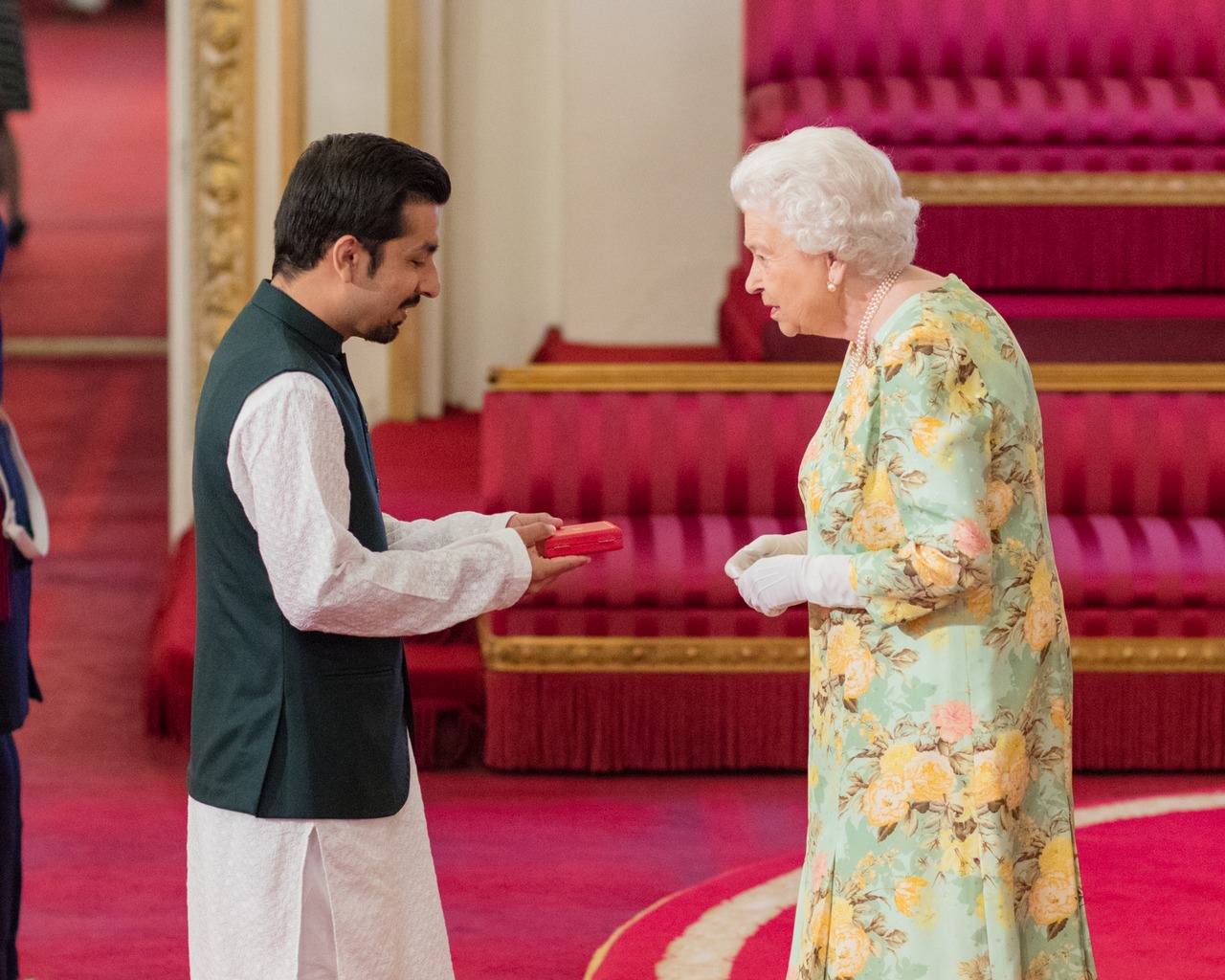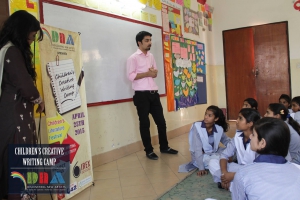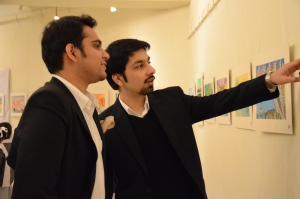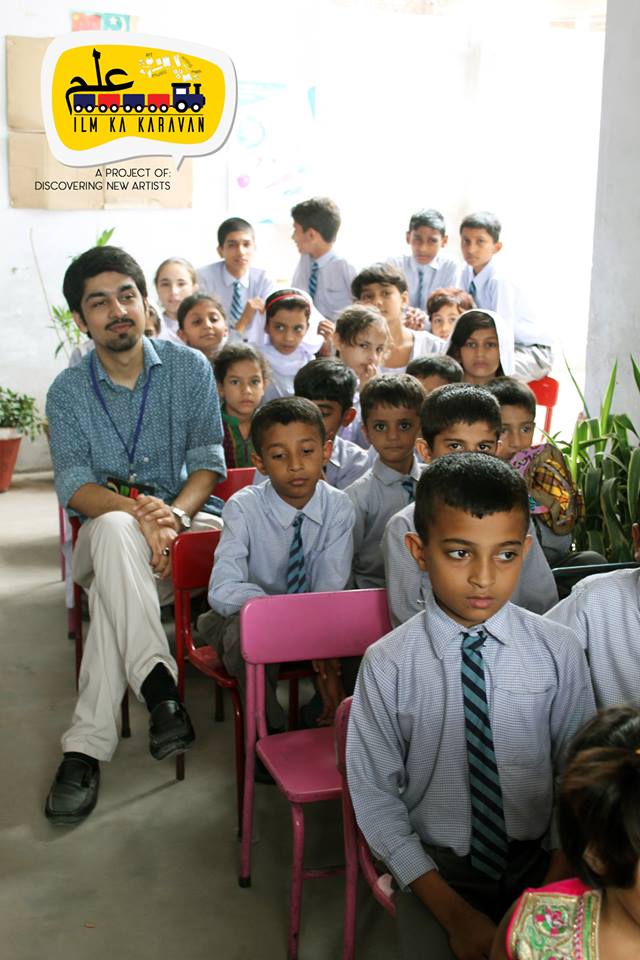On June 23, 2018, Global UGrad alumnus Hassan Mujtaba Zaidi received the coveted Queen’s Young Leaders Award 2018. The award recognizes the achievements of inspiring young leaders from around the Commonwealth for their community service initiatives.
Zaidi attended a semester at Humboldt State University, as part of the Global Undergraduate Exchange Program in Pakistan in spring 2011. He is the founder and director of Discovering New Artists (DNA), a non-profit organization, which aims to provide free education to the underserved children of Pakistan. Here USEFP talks to him about his extraordinary journey and his ambitions for the future.
Congratulations on receiving the prestigious Queen’s Young Leaders Award. What was it like meeting Queen Elizabeth II and Prince Harry?
Thank you for the wishes.
It felt incredible and was a once-in-a-lifetime opportunity when I met Her Majesty the Queen and H.E. Prince Harry. I found the queen and Prince Harry both to be very humble and kind. Her Majesty Queen Elizabeth II asked me about my work on Discovering New Artists and about how I am making a change through art programs in Pakistan.
It was unbelievable that I was inside Buckingham Palace when most people do not get a chance to see it from the inside; I was the lucky one to not only see it from the inside but also to meet the queen and receive my award from her in front of hundreds of prominent people, including David Beckham.
P.S: It was indeed a joyous moment when I saw that the tourists outside Buckingham Palace were waiving at us from outside and taking photographs and videos from their phones.
Tell us about your experience interacting with senior representatives from U.K.’s leading organizations and charities, mentors, and other young leaders from the Commonwealth, during the one-week residential program?
The experience interacting with all the leading organizations, charities, mentors and other young leaders was astonishing as I got to learn tremendously from each one of them. During the residential week, I visited Cambridge and had a chance to listen to some of the leading speakers, Mr. Oli Barret, Frederick Haren and others during sessions that helped me develop knowledge surrounding idea and innovation and business development. I also had a chance to visit AMV BBDO and PwC which are two of the leading advertising and project management agencies in the world and helped me develop the ideas about successful campaigning and project management. Both of these organizations provided me with the opportunity to improve my project by providing me access to individual mentors who were professional and well equipped with the knowledge of developing successful media campaigns and project management.
My visit to BBC World Service was also very fruitful and unique as I had a chance to explore their news studios and have live interviews with the BBC Urdu team. I also had the opportunity to meet the heads of BBC and listen to their insights. Experiencing the crisis game at Uprising – one of U.K.’s charities was remarkable in a way that I learnt to solve conflicts in a limited amount of time.
The visit to Commonwealth Secretariat, meeting the Secretary General of Commonwealth, visit to 10 Downing Street, meeting U.K. Prime Minister Theresa May and the Minister of Education was enthralling and full of insights. It allowed me access to different opinions and outlooks from these influential leaders about some of the world’s most pressing concerns.
Last, but not the least, the exposure and interaction with other Queen’s Young Leaders from 38 different Commonwealth countries provided me a chance to listen to their insights about their countries, the problems which are prevalent in their countries and how these young leaders are tackling some of these problems through their innovative ventures. The kind of networking opportunity I had through the Queen’s Young Leaders programme was so valuable that I am now collaborating with some of these young leaders to take Art for Change to their countries with the collective support from the Queen’s Young Leaders’ team in London.
The Queen’s Young Leaders programme provided me an opportunity to network, explore different avenues of collaboration and expand the work of Discovering New Artists to different parts of the world. This has been made possible not just with the help of Queen’s Young Leaders from Commonwealth countries but also with the help of all the mentors, advisors, and partners of the Queen’s Young Leaders programme which I have been exposed to before and during the residential week.
USEFP is very proud to claim you as one of its UGrad alumni. Can you tell us what led you to apply to the Global UGrad program in 2011, and what your experience at Humboldt State University was like?
I am very proud to be a Global UGrad alumni as I have been given many opportunities to explore and develop my abilities by the Global UGrad Exchange program and its alumni activities.
One of the reasons why I wanted to go for an exchange program to the U.S. was that I generally felt that there wasn’t much awareness about Pakistan in the West other than on issues related to terrorism. I applied to go to the U.S. and introduced our music to the people there. I took a course related to music or singing and organized an event related to South Asian music. I felt that even a small contribution like this could make people realize that there is more to Pakistan than what is known through the media.
Furthermore, I found the cultural diversity and the level of interaction with the Americans offered by this program, very attractive. Though there is somewhat of an anti-American sentiment present in Pakistan, all the Americans I have met in my college are very helpful people. This has aroused my curiosity regarding what other Americans are like and the lives they live. Perhaps they are also misunderstood the way we are. Thus, I hoped to gain exposure and grow as a person.
My experience at Humboldt State University (HSU) was extraordinary in every form. The kind of cultural diversity, friendly atmosphere, learning environment and exciting volunteering opportunity made me learn so much that it really pushed me to a point where I can come back to my community and inform my fellow citizens about my experience at HSU. Moreover, access to professors who had different experiences and outlooks particularly in the field of economics and other subjects in general have allowed me to better analyze the current trends in our economy and understand better how they can possibly improve.
Thus, in short, if I summarize my experience at HSU in one or two words, it was magnificent and full of learning.
Tell us a little bit about the birth of Discovering New Artists (DNA), and how you think the UGrad program contributed to this enterprise?
My time in the U.S. provided me with an opportunity to observe that young people in the U.S. are really motivated to volunteer for their community. Thus, when I came back, I thought it would be great if I can start something productive which can motivate our youngsters to volunteer for their community and make them realize the importance of giving back to their community. Thus, I applied for a $350 Project Smile grant by International Research and Exchange Board (IREX) and developed a small art activity with the name of Discovering New Artists (DNA). The idea was to engage young students to explore their artistic talent, make them work on a specific theme and then sell their artwork to raise enough funds to keep this small project sustainable and support the education of these young orphans.
UGrad provided me this opportunity to initially start off DNA as a project with small seed funding through IREX’s Project Smile. Later on, as my team and I gained the trust of the local community, we also ventured into other areas including setting up school libraries and sponsoring the education of underprivileged children. We realized that in order to promote art education among the underprivileged children, we needed to do more to sustain our efforts. That is why my focus also shifted towards ensuring that deserving children were able to get free education in schools.
That is when DNA’s project Art for Change kicked in. Art for Change, a national child art competition and exhibition aims to forge links between young people in privileged and underprivileged communities. The fee of students who can afford to pay to participate in the competition, is used to enable a child from a marginalized background to enter for free. Further proceeds from the competition are used to fund other educational projects run by DNA. To date, more than 15,000 students have participated in the competition and over 7,500 students have benefitted from donations of art material. Additionally, more than $9,800 in scholarships have been raised for disadvantaged students through Art for Change.
I am delighted to see that every year the interest among students is increasing, thereby allowing us to not only have more underprivileged children participate in Art for Change but also allowing us to sponsor the education of more children.
Art has always been a potent tool for social change, but sadly it’s often a neglected area of study in our education system. What inspired you to use art to promote literacy in Pakistan?
In a county like Pakistan, which is quite often in the news for its law and order situation, where more than 23 million are still out of school, and where 24% of the population lives below the poverty line, it is quite bizarre to talk about creativity in student life and of the importance of art education for children.
However, all these challenges did not dissuade me from pursuing the idea of promoting art education among the underprivileged children of Pakistan. I believe that rote learning coupled with the inability to think out of the box is also one of the root causes of extremism in Pakistan. This is why I started the initiative Discovering New Artists to rekindle the artist within the Pakistani children and bring them to think out of the box. I wanted them to pick up the crayon and paper and visualize their future how they wished to see it. That is how I began to make these small contributions to a society mired with violent extremism and hopelessness.
After Lahore, Karachi and Islamabad, DNA has now gone global with a chapter in Canada. What is your vision for DNA in the coming years?
Let me correct it, Art for Change by Discovering New Artists has reach in more than 20 cities across Pakistan and last year Art for Change went global by including Liberia, Nepal, Canada, and Mali. Now my team and I have a vision to take Art for Change by DNA to as many countries as we can to unite the people of the world through Art.
I believe that art has the power to deliver the strongest messages and help solve some of the most pressing issues in the world. Therefore, if we are able to achieve our initial goal of uniting people through Art for Change at the grass-roots level then we will be able to help resolve some of the world’s biggest problems by raising awareness through art.
Any advice for returning Global UGrad candidates who want to become positive agents of change like yourself?
No one from outside will come to Pakistan and change its fate and work for its betterment. It’s the youth and my fellow young UGrad alum who can give back to their communities and make Pakistan a better place that will contribute towards a more peaceful world.
Global UGrad alum are all doing great work, every day I get to learn about their achievements and these achievements make Pakistan and all its citizens proud. I would like to advise the returning Global UGrad candidates to work passionately to give back to their country and always keep their country first before any personal gains.
The interview has been lightly edited for style and clarity.
Photo credits: Discovering New Artist’s Facebook page.



